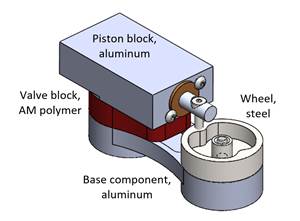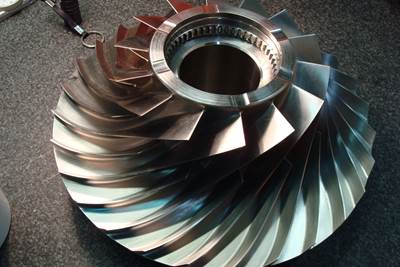People-First Mindsets Improve Machine Shop Acquisitions
Focusing on the human side of the business — employee health, safety, success and growth — is the only way to satisfy both the buyer and seller.
Share






ECi Software Solutions, Inc.
Featured Content
View More

Hwacheon Machinery America, Inc.
Featured Content
View More

Takumi USA
Featured Content
View More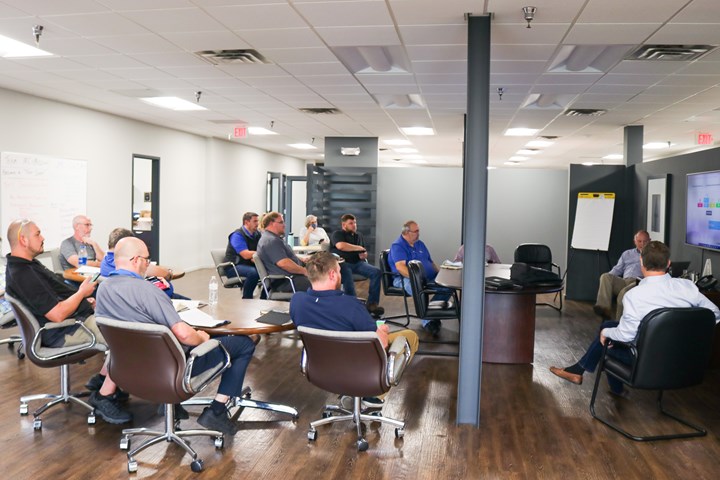
B-Square Precision Group's CEO Mark Beck and CFO Tony Butler empower the leadership of both KAM Tool & Die and JMC Tool & Machine to collaborate and build teams that can take each company to the next level. Here, leaders at JMC & KAM meet to learn new “business system” tools. Photo Credit: B Square Precision Group
With the average age of mold shop ownership nearing 60 and many owners wanting to settle into retirement, an acquisition sounds like a sensible option as long as their people are put in good hands. Therein lies the problem. As stories of private equity firm buyouts gone wrong persist, ownership can be very hesitant to go down the mergers and acquisitions (M&A) road.
What makes for a successful acquisition? If you ask me, it’s considering all aspects of the human side of the business, as well as taking into consideration and care the employees’ health, safety, success and growth. This means a heavy focus on a culture of leadership and lean.
Following this strategy is how B-Square Precision Group’s CEO Mark Beck and CFO Tony Butler have met success with their first two acquisitions.
Building Blocks
B-Square Precision Group currently consists of KAM Tool & Die (Zebulon, North Carolina) and JMC Tool & Machine (Sanford, North Carolina). KAM Tool builds and reverse engineers tools, dies, fixtures and molds. JMC provides precision-machined components and assemblies (10,000 to 30,000 parts per year) to the medical, industrial, aerospace and pharmaceutical markets. Beck and Butler are trying to build a group of companies that cover the precision manufacturing spectrum, and aim to add three more to the B-Square family.
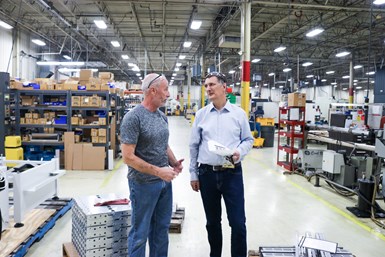
To build the right culture from the start, Beck and Butler tailored their approach to each company. Here, Tony Butler and Frank Patkunas, JMC VP of Operations, walk the factory floor.
“We look for companies that can cross-sell for each other, eliminating what we call a ‘customer concentration problem,’” Beck says. “Many smaller shops have a customer dependency problem, but if you combine five companies that each have a customer concentration problem into one company, you eliminate any customer concentration problems. Then you can grow.”
Leaders Listen
The key to B-Square is culture. “We keep the businesses we acquire and their brands autonomous, we invest in new equipment to grow the companies, we leverage world-class operating techniques and we provide training to every team member,” Beck says.
After acquiring KAM Tool & Die, Beck and Butler came into KAM and presented their four foundational values:
- Integrity — Do What Is Right
- People — The Best Team Wins
- Customers — Be a Trusted Partner
- Performance — Improve Every Day
To uphold these, they met with each employee one-on-one to learn likes, dislikes and future career and educational goals. Beck and Butler both believe that employee buy-in is gained by immediately investing in people and improving their environment.
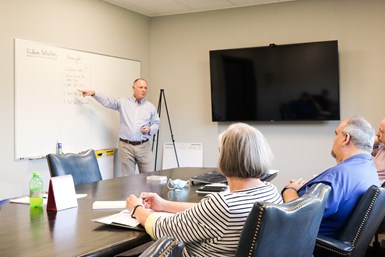
Mark Beck leads a working session to streamline work flows between JMC and KAM. Meetings like this are important to building successful teams.
“Listen,” Butler says. “Get their ideas regarding what can and should change, then do as many as you can (the easy ones) right away. Most of the time, if you allow people to shine, grow and progress, they will not disappoint you.”
For the first quarter, Beck and Butler sat back, watched and learned as the KAM team did their thing. They recognized that watching and listening were vital. Since then, Beck and Butler have been committed to the people and avoided micro-management.
“I couldn't ask for anything better,” says Randy Jones, general manager at KAM. “What they've done for me in the last year and a half has been more than the previous ownership did in 24 years.” For example, Beck and Butler gave immediate raises and bonuses to the whole shop, and instead of coming in and cutting benefits, they improved them — increasing the 401(k) match and decreasing healthcare costs.
Getting Lean
There are also lean initiatives that have made a significant impact on KAM. Two fundamental changes supported their lean approach: a TPM (total productive maintenance) implementation and a scoreboard strategy.
After the first quarter, Beck initiated a visual scoreboard that tracks five metrics: safety, on-time delivery, quality, maintenance and cost.
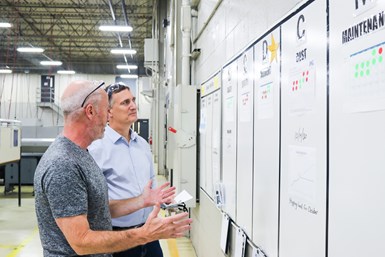
Butler discusses the scoreboard, which tracks safety, on-time delivery, quality, maintenance and cost, with Patkunas.
“We place a green dot on the scoreboard for every goal that we meet and a red dot for each goal we do not meet,” Jones says. “This is posted for everyone to see, which promotes accountability. Then every Monday, we send Mark a report."
Beck and Butler additionally committed to training by bringing in trainers and offering tuition aid. They purchased an unlimited training package from Haas allowing employees to take training courses anytime in its local Greensboro, North Carolina, facility.
Tied to training is mentorship, and Beck believes strongly in mentoring. Once a quarter, he comes in and assigns tasks to help improve employees’ skills to the next level.
B-Square also offers opportunities for employees to train at the other facilities, which may present different career options not available before this acquisition. Plus, this helps to keep them within the B-Square family.
Common Perspective, Different Approach
Howard Nystrom is the general manager and president of JMC Machine & Tool, and was one of the three previous owners prior to B-Square’s acquisition.
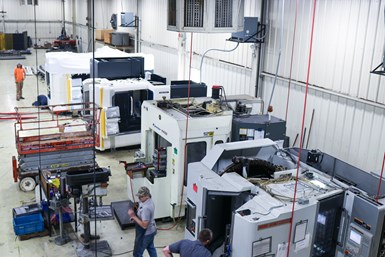
Beck and Butler keep the businesses they acquire autonomous, invest in new equipment, leverage world-class operating techniques and provide training.
Nystrom and the other owners were adamant about keeping things the same for their people as Beck and Butler got to know the business. This was precisely what Beck and Butler had in mind, as they believed in JMC, the current team and the ownership.
Beck and Butler tailored their approach to the company, knowing their strategy with KAM would need adjustments for JMC’s situation and workforce. Their main pushes have been for data-driven approaches, leadership training, improved collaboration among employees and more cross-pollination of customers.
“Before joining B-Square, we met only when we needed to meet, and now we have structured meetings that have opened up communication,” Nystrom says. “What was once a tight, three-owner inner circle is now open to other key team members like the sales manager or the quality manager. Employees have more information. They know more about what's going on in the organization.”
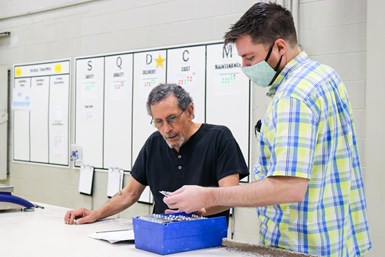
Structured meetings have opened up communication across B-Square’s companies.
Beck and Butler’s leadership approach is to be supportive and help the team accomplish its objectives, but not to tell the team how to do it. They want these businesses to be able to run on their own. “Plus, they understand the required capital investment and the need to add capability if you’re going to maximize the efficiency and the utilization of what you have in your shop,” Nystrom says.
For those shops out there considering an acquisition, Nystrom advises preparation. “Ensure you have a solid management team in place, understand your growth story, learn to be proud of who you are, talk to other people that have been through this and work with an M&A firm.”
For those shops in the throes of the early stages of new ownership, Nystrom emphasizes the importance of being open to change. “No one should change just for the sake of change, but you should also not keep doing something just because you've always done it that way.”
Related Content
Workholding Fixtures Save Over 4,500 Hours of Labor Annually
All World Machinery Supply designs each fixture to minimize the number of operations, resulting in reduced handling and idle spindle time.
Read MoreSolve Worker Shortages With ACE Workforce Development
The America’s Cutting Edge (ACE) program is addressing the current shortage in trained and available workers by offering no-cost online and in-person training opportunities in CNC machining and metrology.
Read MoreDN Solutions Responds to Labor Shortages, Reshoring, the Automotive Industry and More
At its first in-person DIMF since 2019, DN Solutions showcased a range of new technologies, from automation to machine tools to software. President WJ Kim explains how these products are responses to changes within the company and the manufacturing industry as a whole.
Read MoreHow to Pass the Job Interview as an Employer
Job interviews are a two-way street. Follow these tips to make a good impression on your potential future workforce.
Read MoreRead Next
MMT Chats: Tips for a Successful Acquisition
MoldMaking Technology Editorial Director Christina Fuges chats with Fran Brunelle, President of Accelerated Manufacturing Brokers about the ins and outs of today's successful manufacturing mergers and acquisitions.
Read MoreHow Champions Can Develop a Thriving Workforce
Having a workforce development champion in your shop is more critical now than ever before. Here are five techniques your champion can apply to attract and retain new talent.
Read MoreWhen Organic Growth in Your Machine Shop Isn’t Enough
Princeton Tool wanted to expand its portfolio, increase its West Coast presence, and become a stronger overall supplier. To accomplish all three goals at once, acquiring another machine shop became its best option.
Read More





































